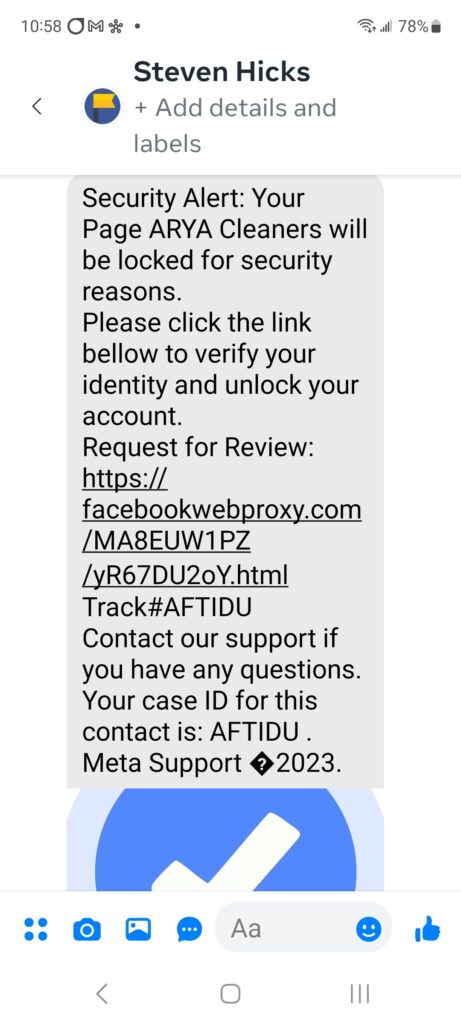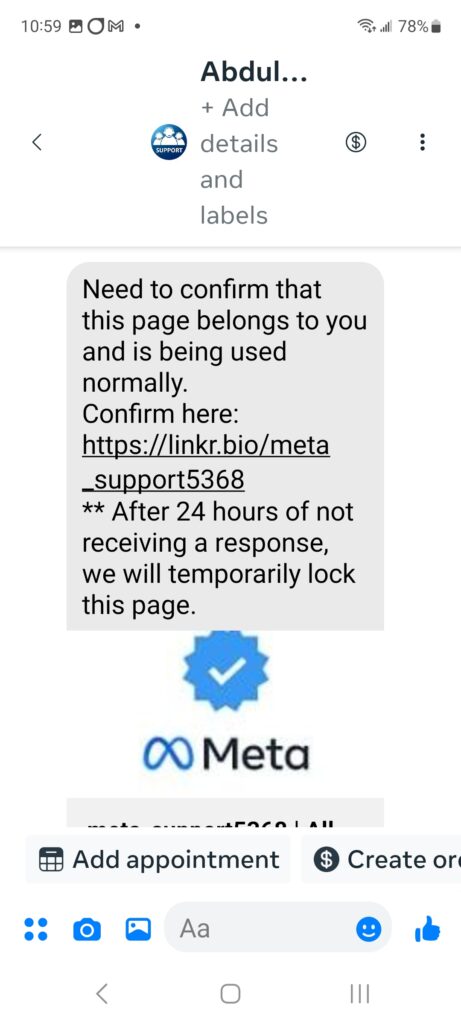WARNING: Yet ANOTHER Facebook scam is out and about! It’s like the scammers have no end to their creativity and persistence. But, obviously their scams are resulting in success as more and more scammers are piling onto the latest scam. Read on to learn more and how to NOT fall prey to this latest barrage of time wasting scammer effort.
Have you received this message, or one similar to it via Facebook messenger from your Facebook business page?


Whoa! Looks official, and rather scary to think all the time, effort and work you put into building up your Facebook business page, growing your audience, developing content and now suddenly you receive what appears to be an official looking notice that Facebook is going to suspend or delete your page! Oh no! But wait, there is a link to click in the message to dispute the cancellation action……..
DON’T DO IT!
DON’T CLICK THAT LINK!
IT’S A FAKE MESSAGE DESIGNED TO HIJACK
YOUR PAGE OR SCAM YOU!
First off, take a good look at WHO is sending you that message. Real Facebook messages come from Facebook it’self, or one of their many departments. One can be easily fooled as Facebook is a huge operation with many departments, departments such as ‘Policy’, ‘Security’ and ‘Community Standards’. Scammers know this, so they write up their messages to spoof or sound official and convincing, preying on those who are not aware of real departments or simply do not know or understand the hierarchy of administration at work behind the scenes of the social media tool they are using.
Part of the problem with social media is anyone can create a fake profile, all one needs is a free email address from Hotmail, Yahoo or Gmail, then create a user name and password. Nothing required out of pocket to anyone with a total investment of ZERO dollars, a little time and malicious intent can create a social media account and start scamming. I’m pretty sure Steven Hicks and Abdoul are fake profiles, fake accounts and were created just to scam people. While the names sound real, they are pretty general and common, like Smiths and Jones (no offense to real Smith’s and Jones’ named people out there). But, again, that’s part of the scam, scammers want your confidence and think that you are dealing with a real Facebook employee (but you are not, nor will you be until it’s too late).
How can I be so sure this message is fake, or part of a scam? Well, it’s not like I have access to an official Facebook Employee list (but I do have a team inside Facebook I do work with). Facebook does offer a secure messaging tool within your Facebook business page and again within your ‘Businesss.Facebook.com’ account (the facebook sub-domain and administrative tool Facebook supplies you to administer your business page and business advertising account). Any official (and real) message Facebook needs to send you will be copied in the ‘messages’ area. If a message is real, you will find it copied in there. It’s a secure communication and message verification system Facebook offers because it’s highly unlikely Facebook it’self will be hacked or security compromised. So, it you don’t see an identical copy of the message from Steven and Abdoul in that secure area, well, it’s very certain it did not come from Facebook (and it’s fake).
Take a good close look at the link in the message. Notice the domain names? Facebookwebproxy dot com (spelled out so as not to provide a live link to scammers) and Linkr dot Bio. Neither of these are the official Facebook.com domain name. You can always do a WHOIS domain name look up to discover who is the registered owner of any domain. Legitimate companies like Facebook don’t have an issue being identified as a legitimate domain name property owner, so you will find registration details for their domains readily available. Scammers, who want to hide, will obscure or hide their contact details. Google ‘whois domain name look up’ to learn more.
Ignore the official looking g logo. Again, scammers are trying to appear legitimate. Anyone can ‘right click’ and ‘save as’ any image online, or take a screen shot of a real logo and then use it to appear legitimate. It’s all part of the scam to encourage you to be confident that you are dealing with Facebook (but you are not).
Why would scammers do such fakery? Well, considering the amount of time and money you may have spent building your online profile and all he money you invested creating content, not to mention the dollars in sales you can generate driving traffic and making sales from your fan base and followers, odds are a successful scammer who can gain access or control over your business account, it’s very likely you would pay ransom or blackmail to get your business page access back. Yes, there is good and easy money to be made hijacking business pages, if suspect that the sudden surge in fake messages I’m receiving from my pages and those I look after for my clients, there must be a lot of folks falling for this scam. If nobody fell for it, the scammers would stop.
What to do if you are targeted:
Never pay ransom. Scammers are all about the money. If you don’t pay, they are wasting their time. Without profit or payment, scammers will move on.
Always investigate questionable messages, or messages that seem odd, or unusual. Check the account of the person sending you messages. A fake account has little or no information, few pictures and few posts. Scammers can’t be bothered to invest a lot of time into a fake profile, so they take shortcuts or fill in very little on a profile.
Report fake profiles. Report any profile that appears to be fake. If it’s real;, Facebook will allow it to stand. If it’s fake, Facebook will remove it. Either way, report and let Facebook figure it out.
Ban fake profiles from ever posting to you again. You can block fake accounts. Do it.
Report fake messages. Mark them as spam. Eventually, Facebook’s monitoring and security will kick in and block or remove fake messages and accounts, but only if you report them. Report away! It’s doing your part to make the online community safer for all of us.
Lastly, consider hiring a social media consultant and ad them to your social media pages in an administrative role. For a few bucks, folks like myself will monitor your social media profiles, monitor messages and keep scammers and spammers at bay. It’s not a huge investment and it’s money well spent to save you a lot of work and learning.
If you want to learn more, or ask questions, please feel free to reach out to me. Just use your real profile to do so as I am quick to block and report fakers and scammers.
Darcy Moen opened his first drycleaning shop at the age nineteen. Over the next sixteen years, he built his first 600 square foot plant into a chain of 5 stores, creating and testing his own marketing programs along the way. Darcy is a multi-media marketer, working in digital signage, video, print, direct mail, web, e-mail and is a social media expert certified by Facebook for Pages, Insights and Ad Systems. Please visit www.drycleanersuniversity.com.

